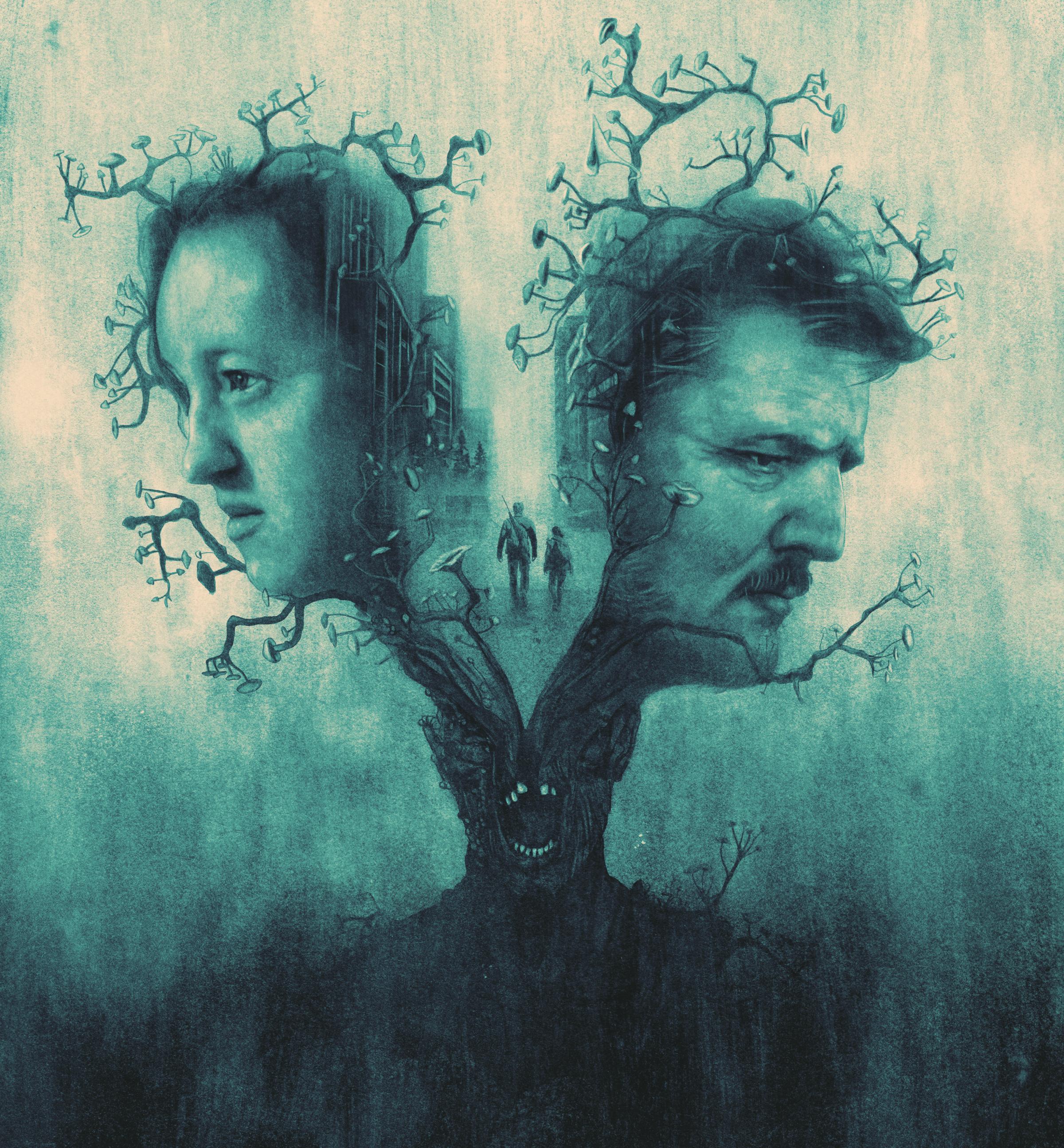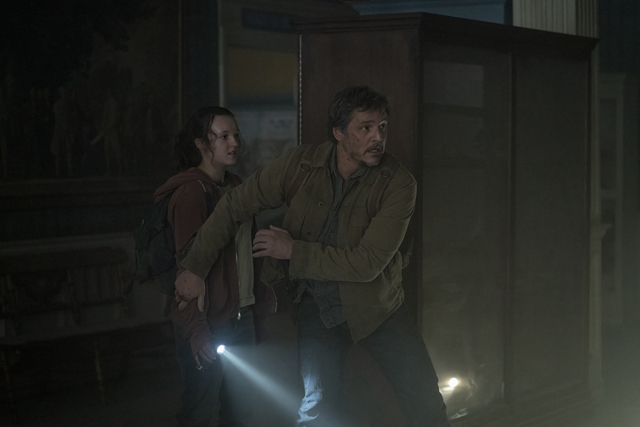Adaptations of books serve an obvious purpose: They make substantial something you’d previously only imagined. The joy of watching Game of Thrones as a reader was seeing the dragons rendered, or hearing the “The Rains of Castamere” for the first time—even if you knew the song was heralding the atrocities of the Red Wedding.
A video-game adaptation doesn’t have the same raison d’être. Arguably very few have improved upon their source material. Visuals from the medium’s leading studios, like Naughty Dog, rival the best visual effects in television and film. Many critics would argue not only that Naughty Dog’s Indiana Jones–esque Uncharted adventure games looked far better than last year’s film adaptation starring Tom Holland, but also that the emotional resonance of the story was lost in translation.
Neil Druckmann, the co-president of Naughty Dog, offered faint praise for that particular movie, over which he had little creative control. He has been much more invested in the new HBO series based on the game closest to his heart, The Last of Us, which debuts Jan. 15. The premise may sound familiar: A fungal infection transforms most of earth’s population into zombies. Twenty years later, a smuggler named Joel, who lost his daughter early in the pandemic, begrudgingly agrees to play bodyguard to 14-year-old Ellie, who may hold the key to a cure. He ushers her across a post-apocalyptic landscape inhabited by tribes of hungry humans and the eerily gorgeous, mushroom-headed undead.

Yet critics agree that The Last of Us is high art, perhaps the greatest video game ever created, in large part because of the moral conundrums into which it regularly thrusts players. The 2013 game sold more than 1 million copies in its first week and went on to win bundles of accolades. Its high standing and complex moral universe loomed large over an adaptation, a process set in motion nearly a decade ago that ultimately found Druckmann teaming up with Chernobyl showrunner Craig Mazin. Mazin, whose Emmy-winning HBO series shares considerable DNA with the story, says the game “was literature to me.” The duo, aided by a $100 million budget courtesy of HBO, enhance the visuals of city ruins devoured by nature and coax wrenching performances from their leads, Pedro Pascal as the gruff yet tender Joel and his Game of Thrones co-star Bella Ramsey as the foul-mouthed but vulnerable Ellie.
But justifying its existence, and that hefty price tag, will come down to more than offering up a love letter that faithfully reproduces a story that revolutionized the medium. The power of the video game is that it implicates the player in the morally compromising decisions Joel and Ellie must make to survive. Can that power be replicated when a controller is replaced by a remote?
In most games, players fire off bullets to kill faceless goons, known as nonplayable characters or NPCs, without a second thought. In The Last of Us, every enemy has a traumatic past or a sympathetic backstory. Every bullet carries a moral weight the player must bear. Confronted with a particularly difficult decision, you might run around the world of the game trying to find another way to surpass a barrier rather than committing some truly awful act. But there’s only one, terrible path forward. The Last of Us Part II doubled down, programming NPCs to beg for mercy as you kill them. (Mazin says the even darker sequel will serve as the source material for a second season, if HBO gives it the green light.)
Review: The Last of Us Part II Is a Revolutionary Video Game—and an Unbelievably Grim One
Mazin knew that maintaining this tension was critical to the TV series’ success. “When you’re watching television, which is passive as opposed to the interactive aspect of playing video games, your moral complications come from your emotional attachment to the characters you love,” he says. “You begin to root for them, even as they do bad things.” He cites audiences clinging to Walter White as he devolved from antihero to villain.

The showrunners zeroed in on one of the game’s major themes: protecting your loved ones at the expense of the greater good. As Joel and Ellie make their way west, they encounter individuals ready to kill for a sibling, a lover, or a child, even if it imperils the survival of humanity at large. Of course, if everyone in the apocalyptic hellscape prioritizes protecting their own, good guys and bad guys cease to exist. There’s no social contract, no righteous moral code. Only survival and vengeance. That may sound like a rather negative assessment of humanity. But, Mazin argues, the game—and the show—is a love story.
“The Last of Us is about the best and worst of love. Love is the strongest and most beautiful human emotion. It leads us to create life and nurture and spread joy and light and peace,” he says. “But if you scratch the surface of xenophobia, racism, tribalism, you also find love. It’s a darker love, protective to the point of violence. It’s the kind of love that says, ‘My kid’s life is worth more than your kid’s life.’ Well, is that true?”
This murky moral philosophy applies to just about everyone Joel and Ellie encounter, from an informer who will snitch on heroes to save his sick brother to the leader of a tribe who will risk the lives of her entire militia to avenge her brother’s death. Mazin and Druckmann find the most room to expand on the game’s storytelling in these diversions from Joel and Ellie’s journey. A gorgeous “bottle episode” about a survivalist and his partner, played respectively by Parks and Recreation’s Nick Offerman and The White Lotus’ Murray Bartlett in a perfect bit of casting, is the show’s Emmy-worthy moment. The survivalist is willing to damn the rest of the world to protect the man who stumbled into his hideout. “We keep circling around the same story,” says Mazin. “What do we do when we’re missing the love we need, and what do we do when we have too much love and that love can cause danger?”
In a game, you’re compelled to stick with even the most harrowing stories. There’s a next goal to meet or a checkpoint to reach. That ask may be more challenging for a television audience. The 81-minute premiere sets the tone with a series of rather gruesome deaths. Mazin hopes that with the move to television, audiences can at least process this darkness collectively. “We play video games on our own,” he says. But if most viewers tune into new episodes of The Last of Us every Sunday night and discuss it the next morning, “they are sharing a communal experience.”
What they will watch together is Joel’s heart slowly cracking open. The reluctant guardian turned father figure is a familiar trope; in fact, Pascal plays one opposite an adorable baby Yoda in another series, the Star Wars spin-off The Mandalorian. But the emotional arc of such stories tends to consist of a child helping their adopted parent grow into a better person. That isn’t necessarily the case here. While Ellie might look like the perfect fit for Joel’s emotional wound—a surrogate daughter for a lost one—his fear of losing another child could overwhelm his capacity for reason. And a parent figure brings out something feral in the orphaned Ellie. “They don’t make each other better per se,” says Mazin. “Joel had such an enormous love for his daughter, and this other kid comes along that’s so different in almost every way. And he ends up loving her a little bit more because she’s more like him. And that’s a problem.”
Review: HBO’s The Last of Us Adaptation Is Astonishingly Well Made—But Something’s Missing
Mazin hopes the audience will feel protective of the duo, but also question that devotion. “This isn’t meant to be perfectly beautiful,” he says. “This is a study of potentially extraordinarily dangerous codependency.”
In a midseason episode, Joel and Ellie accidentally drive into a trap set by a rebel group that’s recently overthrown the fascistic military regime in their city. The old government turned neighbors against one another and conscripted children into battle. In any other story, these revolutionaries would be heroes. But they’ve pinned our protagonists down. Joel begins to shoot their way out, but he’s middle-aged with achy knees. He’s lost a step. A man barges into the room behind Joel, and Ellie reaches for a gun and must decide what to do. She’s never shot an uninfected human before. If Mazin and Druckmann have done what they set out to do, a shot of Ramsey’s finger on the trigger will feel as visceral as having your own finger on the button of your controller. It may be an impossible feeling to replicate exactly, but we wouldn’t have more than a century of rich cinematic history if there weren’t power to be found in watching angst cast a shadow across an actor’s face.
More Must-Reads from TIME
- Donald Trump Is TIME's 2024 Person of the Year
- Why We Chose Trump as Person of the Year
- Is Intermittent Fasting Good or Bad for You?
- The 100 Must-Read Books of 2024
- The 20 Best Christmas TV Episodes
- Column: If Optimism Feels Ridiculous Now, Try Hope
- The Future of Climate Action Is Trade Policy
- Merle Bombardieri Is Helping People Make the Baby Decision
Write to Eliana Dockterman at eliana.dockterman@time.com